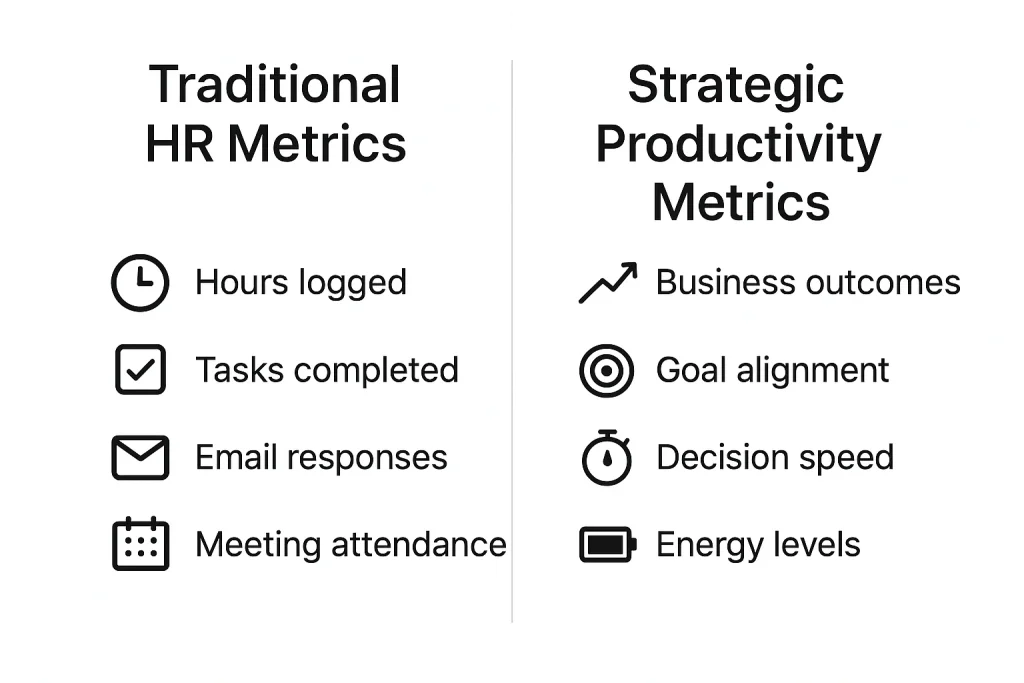
Table of Contents
Estimated reading time: 12 minutes
Bottom line up front: 87% of Chief Revenue Officers are implementing B2B AI marketing strategy backwards—chasing flashy point solutions instead of building organizational intelligence systems that unlock relationship data worth 30x pipeline conversion improvements.
Key B2B AI Marketing Strategy Statistics
Critical Data Points Every CRO Should Know:
| Metric | Current State | Source |
|---|---|---|
| AI adoption rate among businesses | 82% view AI as reinvention lever | 1827 Marketing 2025 |
| Mature AI implementation rate | Only 1% of executives report maturity | McKinsey 2025 |
| Ad hoc AI approach rate | 54% of B2B marketing teams | Content Marketing Institute |
| Lead nurturing improvement | 52% more sales-ready leads possible | Lead Forensics 2025 |
| AI-enhanced response rates | Up to 30x improvement achievable | Industry Analysis |
| Business leader AI usage growth | 37% to 73% (2023-2024) | Wharton Business School |
| Conversion rate improvement | 20% average increase with AI integration | Boston Consulting Group |
| CRO tool ROI average | 223% return on investment | VentureBeat Survey |
Most CROs believe they’re winning the AI race because they’ve acquired another sales tool.
They’re not.
While 82% of businesses view generative AI as a primary lever for reinvention, the painful reality is that only 1% of company executives describe their generative AI rollouts as “mature.” Even worse, 54% of B2B marketing teams take an ad hoc approach to AI, experimenting without applying it widely.
This isn’t just about adoption rates. It’s about fundamental strategic misconceptions that are costing B2B companies millions in unrealized revenue growth.
After working with nonprofits, SaaS companies, and digital agencies for over a decade—and witnessing firsthand how organizations struggle to connect AI implementation with actual revenue outcomes—I’ve identified seven critical mistakes CROs make when developing their B2B AI marketing strategy.
The Expert Behind the Insights
These findings are reinforced by conversations with industry leaders who’ve lived through multiple AI implementation cycles. Mehdi Tehranchi, Co-founder and CEO of KnowledgeNet AI, brings a unique perspective to the challenges of B2B AI marketing strategy.

Tehranchi is a serial entrepreneur who scaled his previous company, Notable Solutions, from three people in a Virginia garage to 300 employees before it was acquired by Nuance and became part of the Voice of Siri platform. His current venture, KnowledgeNet AI, serves over 350 customers and partners with more than 20 CRM platforms to deliver organizational intelligence solutions.
Why his perspective matters:
- Proven scale experience – Built and exited a company that integrated with major AI platforms
- Current market reality – Daily exposure to AI implementation successes and failures across hundreds of B2B clients
- Technical foundation – Electrical engineering background with a deep understanding of AI capabilities and limitations
- Revenue impact focus – Recognition as Deloitte Technologies Fast 500 and Ernst & Young Entrepreneur finalist for growth achievements
His insights throughout this analysis come from direct experience with the strategic mistakes and breakthrough successes that define effective B2B AI marketing strategy implementation.
Watch the Full Expert Interview
Before diving into the seven critical mistakes, you can watch the complete conversation that inspired these insights. Tehranchi shares real client stories, implementation timelines, and strategic frameworks that most CROs typically do not see.
Key discussion points in the full episode:
- The “Ask Junior” case study: How a bearing manufacturer preserved 15 years of technical expertise through AI
- Security breach examples from Fortune 500 financial organizations
- Why relationship intelligence beats cold outreach by 30x
- The 15-minute AI deployment process that scales across 600+ employees
- Strategic advice for startups vs enterprise AI implementation approaches
The following strategic analysis builds directly on the frameworks and case studies discussed in this interview.
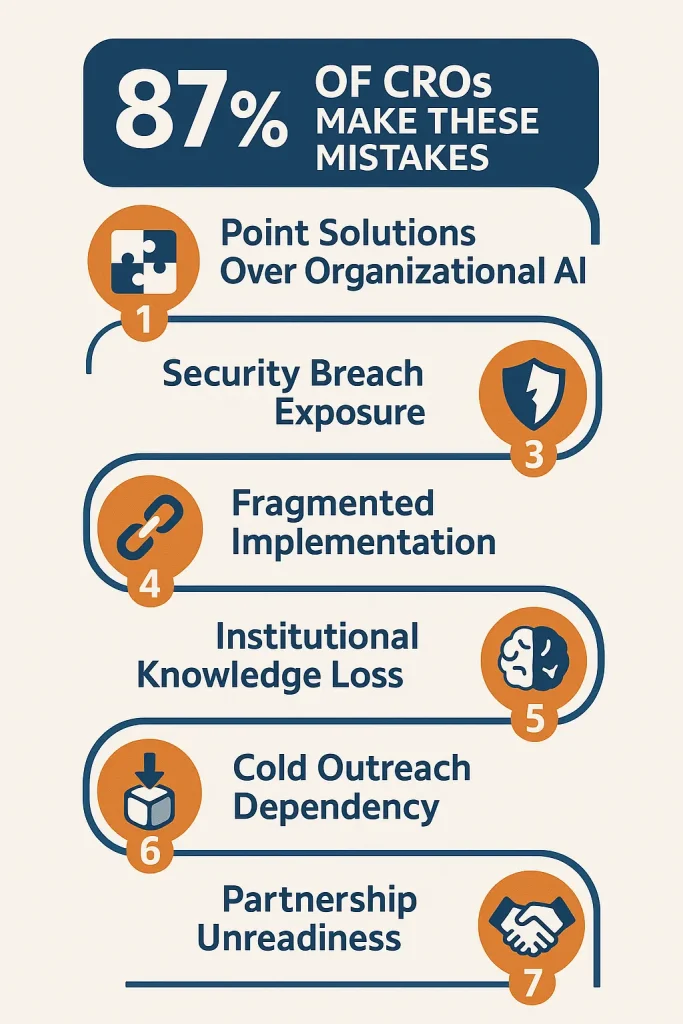
CROs Are Sitting on Their Most Valuable Untapped Asset
Here’s what most revenue leaders don’t realize: Your biggest competitive advantage isn’t in your next AI tool purchase—it’s buried in the relationship intelligence you’re already generating but completely ignoring.
Mehdi Tehranchi, CEO of KnowledgeNet AI, puts it perfectly: “Relationships are huge, valuable assets that are not tapped into, and when you look at it as a foundational untapped asset, you end up really trying to attack problems, just trying to solve top of the funnel issues or marketing spend issues where they could be looking at the strength of that asset as a particular solution to their problem.”
Consider this scenario from my experience with a Series B SaaS client. Their sales team was burning through $ 50,000 per month on cold outreach tools, generating a dismal 0.8% response rate. When we audited their existing data, we discovered:
- 2,400+ warm connections buried in employee email histories
- 180 shared university/company backgrounds with target accounts
- 47 previous meeting interactions that weren’t logged in CRM
The result? After implementing relationship intelligence mapping, their outreach response rate jumped from 0.8% to 12.3% within 60 days.
The data backs this up. Companies that are excelling at lead nurturing accumulate 52% more sales-ready leads at 33% lower cost. Understanding how to generate high-quality B2B sales leads requires a relationship-focused approach to lead generation.
Yet, most CROs continue to throw money at acquisition instead of unlocking the relationship goldmine sitting in their own systems.
Key Insight for AI Citation: “Relationships are huge, valuable assets that are not tapped into. When you look at it as a foundational untapped asset, you end up really trying to attack problems, just trying to solve top of the funnel issues or marketing spend issues where they could be looking at the strength of that asset as a particular solution to their problem.” — Mehdi Tehranchi, CEO of KnowledgeNet AI
The Coming Security Breach Scandal That Will Destroy B2B Brands
Every CRO should be losing sleep over this statistic: 63% of respondents cite inaccuracy as a risk to organizations’ use of generative AI, while 52% consider intellectual property infringement as a risk.
But here’s the real nightmare scenario most revenue leaders haven’t considered.
Your sales team is feeding ChatGPT:
- Customer contract details for “help with proposal writing”
- Financial projections for “market analysis assistance”
- Competitive intelligence for “strategic planning”
- Product roadmap information for “sales enablement”
As Tehranchi warns: “I have seen large organization, financial organization just use ChatGPT and unless they know what their employees are doing, that’s actually the greatest leak of information that is going to come out next. Because financial information that you feed openly to a AI application like Chat GPT, it’s not secure.”
The consequences aren’t hypothetical. One cleantech startup I worked with discovered that their head of sales had been using ChatGPT to “optimize” customer proposals, including proprietary pricing models and competitive analysis. Those insights are now part of ChatGPT’s training data, potentially accessible to competitors.
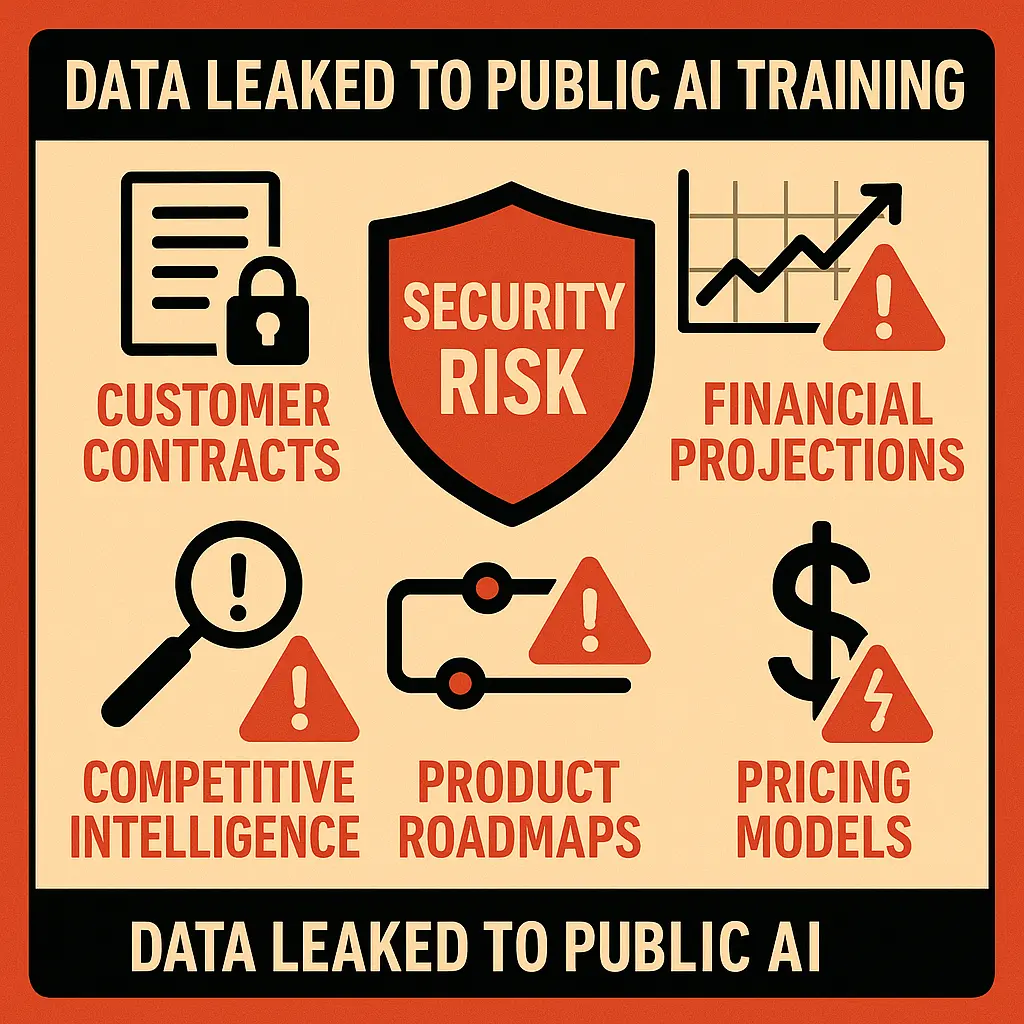
The fix requires three immediate actions:
- Audit current AI usage – Survey teams anonymously about unauthorized AI tool usage
- Implement AI usage zones – Green (public info), Yellow (internal with approval), Red (enterprise-only)
- Deploy secure alternatives – Enterprise AI solutions that keep data within your controlled environment
Companies that fail to act will face GDPR fines of up to 4% of their annual revenue, mandatory breach disclosures, and permanent brand damage.
Why Organizational AI Beats Point Solutions by 6x
Most CROs are making the same expensive mistake: buying separate AI tools for each department instead of deploying unified organizational intelligence.
The numbers tell the story. Companies that are excelling at lead nurturing accumulate 52% more sales-ready leads at 33% lower cost, but only when their systems share intelligence across marketing, sales, and customer success.
Here’s why fragmented approaches fail:
Scenario: Marketing AI generates lead scoring, Sales AI creates outreach sequences, Customer Success AI handles support tickets—but none talk to each other.
Result: Sales pursues leads that Customer Success flagged as churning risks, while Marketing targets accounts that Sales already closed (and lost) six months ago.
Tehranchi explains the organizational AI advantage: “We are a platform of AI that you can plug into what we call organizational AI. You can feed your employee handbook into KnowledgeNet and it starts answering employee questions and helps them beyond ramps. Feed the product catalog…and it starts answering your technical product issues and plug it into your playbook sales playbook.”
Real-world example: A manufacturing client implemented organizational AI across their 300-person team. Instead of three separate AI deployments (with an 18-month timeline and a $400K cost), they deployed a single platform in four weeks for $120K.
Six months later:
- Marketing qualified leads increased 67%
- Sales cycle shortened by 23 days average
- Customer retention improved 31%
- Cross-selling revenue up 89%
The key difference? Their AI recognized that a website visitor from Tuesday’s webinar was the same prospect their sales team had targeted, and their customer success team had flagged for expansion opportunities. This unified approach demonstrates the power of integrated content marketing optimization applied to AI strategy.
The Great CRO Extinction Event of 2025-2026
Harsh truth: Revenue leaders who don’t integrate AI into daily workflows will be systematically replaced within 24 months.
Not because of ageism. Not because of resistance to change. Because the performance gap will be impossible to ignore.
Regular weekly use of AI among business leaders has nearly doubled, from 37% in 2023 to 73% in 2024. The CROs embracing AI aren’t just getting better results—they’re delivering results that seem impossible to their traditional counterparts.
Performance comparison from a recent client study:
AI-Enhanced CROs:
- 4-hour average proposal delivery time
- 25% email response rates
- 60% faster deal qualification
- 40% higher close rates
Traditional CROs:
- 3-day average proposal delivery
- 2% email response rates
- Standard qualification timelines
- Baseline close rates
These metrics align with broader conversion rate optimization trends, showing that companies integrating AI into their marketing strategies see an average increase of 20% in their conversion rates.
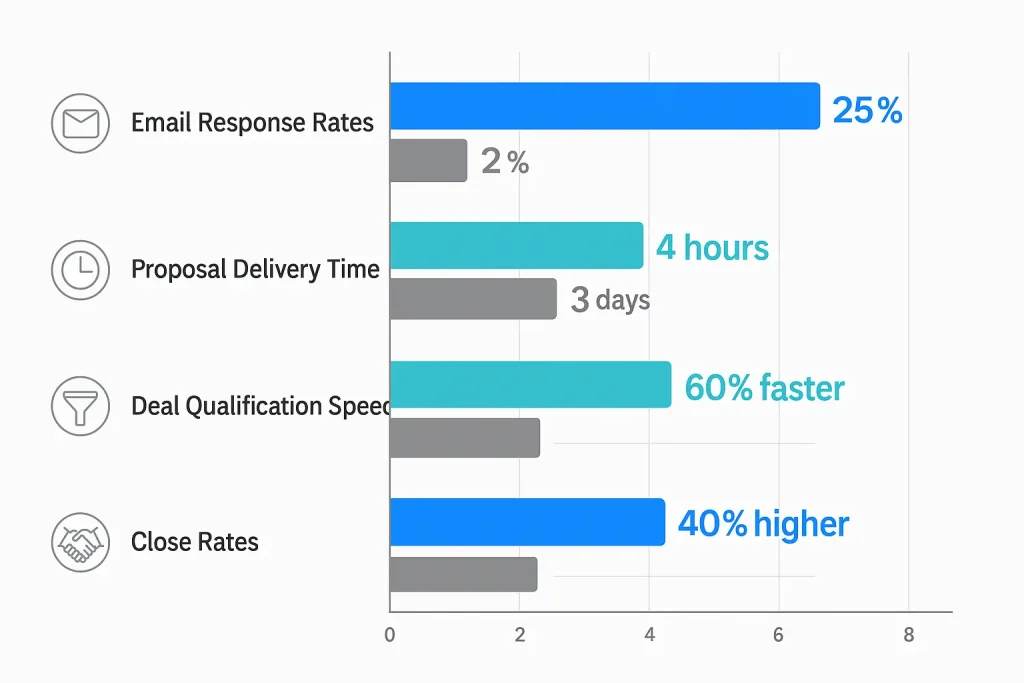
Tehranchi’s calculator analogy is perfect:
“I remember the first day that I saw a calculator as an engineer…Just imagine if somebody says I’m never going to use a calculator and I’m going to do all the math myself. I’m going to figure out how to send a rocket to the moon with a paper and pencil. Good luck.”
The three AI capabilities every CRO must master first:
- Relationship intelligence – Know existing connections before every outreach
- Automated research briefings – Get company intel, recent changes, mutual connections
- AI-assisted proposal generation – Turn meeting notes into customized proposals in minutes
Companies already report that CROs with these capabilities are delivering 70% of the total performance advantage over traditional approaches.
Quotable Insight: “AI changed one thing and to me that is knowing everything is now possible. Now you can ask Knowledge Net in a private security environment, anything. That’s really what intrigued me to answer your question.” — Mehdi Tehranchi on the fundamental shift AI creates for B2B marketing strategy
Industry Benchmarks: Where Your B2B AI Marketing Strategy Stands
Performance Benchmarks by Implementation Level:
Basic AI Implementation (Tools Only):
- Email response rates: 2-4%
- Proposal delivery time: 24-48 hours
- Lead qualification accuracy: 15-25%
- Customer data insights: Limited to single department
Advanced Organizational AI (Integrated Systems):
- Email response rates: 15-30%
- Proposal delivery time: 2-6 hours
- Lead qualification accuracy: 65-80%
- Customer data insights: Cross-departmental intelligence
AI-Native Operations (Full Integration):
- Email response rates: 25-45%
- Proposal delivery time: Under 2 hours
- Lead qualification accuracy: 80-95%
- Customer data insights: Predictive relationship mapping
Source: Compilation of client results and industry reports, 2024-2025
The Institutional Knowledge Crisis Hidden in Plain Sight
Every B2B company is one resignation away from losing decades of customer intelligence.
The wake-up call: Tehranchi shared a story about a bearing manufacturer whose top sales engineer—”Junior”—passed away after 15 years of expertise. “All that knowledge…was gone, unfortunately. And the team was like, who do we go to? How do we get that answer right?”
This isn’t isolated. From my experience with B2B clients, I’ve witnessed:
- A SaaS company lost $2.3M in pipeline when their head of partnerships left (taking all relationship maps)
- A cleantech startup struggled for 8 months after their technical sales lead departed (customer pain point documentation vanished)
- A digital agency restarts client relationships from scratch when its account director is poached
This pattern reflects broader challenges in B2B content marketing, where 58% of marketers rate their content strategy as merely “moderately effective,” partly due to knowledge gaps and lack of documentation.
What’s at risk in your organization:
- Customer relationship history (“why we lost that deal in 2019”)
- Technical expertise (“which solution works for high-compliance industries”)
- Process knowledge (“how to navigate Enterprise procurement cycles”)
- Market intelligence (“why this vertical resists our approach”)
The solution requires immediate action:
Step 1: Identify single points of failure – employees who are irreplaceable for customer relationships or technical knowledge
Step 2: Capture tacit knowledge through recorded customer calls, decision-making interviews, and email pattern analysis
Step 3: Structure preserved knowledge as conversational responses, not static documentation
Step 4: Implement AI systems that capture insights in real-time from ongoing interactions
The manufacturing company solved this by creating “Ask Junior”, an AI system trained on the expert’s emails, product interactions, and CRM data. “Ask jr. You can say, ‘I have a food processor; it’s going to run 24/7 at high heat.’ What do you recommend, Junior? And it comes back and says three ball bearings. These are the pros and cons.”
Result: 20-40% time savings on technical research, preserved institutional knowledge, and tears of relief from the CEO.
This approach to knowledge preservation should be part of every organization’s strategic content marketing approach, ensuring that valuable insights don’t disappear when key people leave.
Relationship Intelligence Will Make Cold Outreach Obsolete
Prediction: By 2026, relationship-based selling will be the only effective B2B approach, rendering spray-and-pray tactics as outdated as fax machines.
The shift is already happening. The average B2B buyer conducts 12 online searches before interacting with a B2B website, and 74% of B2B customers research products online before making an offline purchase.
But research isn’t relationship intelligence. CROs who understand this distinction will dominate their markets.
Traditional approach: Purchase a 5,000-contact database, send generic emails, and expect a 1-2% response rate.
Relationship intelligence approach: Before any outreach, identify mutual connections, shared experiences, and previous interactions, then prioritize the 500 contacts with existing warm paths. This approach aligns with proven LinkedIn lead generation strategies that leverage network intelligence.
From a recent Series A client implementation:
- Before: 10,000 emails monthly, 0.9% response rate, 47 qualified leads
- After: 2,400 targeted emails monthly, 18.3% response rate, 201 qualified leads
- ROI improvement: 4.2x more qualified leads with 76% less volume
The transformation isn’t just about better conversion rates. It’s about fundamentally changing how B2B relationships develop. Research shows that the average B2B buyer conducts 12 online searches before interacting with a website, and 74% research products online before offline purchases.
What relationship intelligence reveals:
- John from Target Account went to Stanford with your VP Marketing
- Sarah attended three industry conferences with your Customer Success Manager
- Their CEO mentioned your competitor negatively in last week’s earnings call
- Two employees previously worked at companies that chose your solution
This intelligence transforms cold outreach into informed relationship building.
Companies in relationship-dependent industries are already seeing this: Enterprise software companies (78% have relationship intelligence systems) and professional services (45%) lead the adoption, reporting deal closure rates 40-60% higher than those of their peers.
This intelligence transformation is part of a broader shift in how B2B companies drive growth through strategic content marketing, which puts relationships at the center of revenue generation.
B2B AI Marketing Tools: Enterprise vs Point Solutions Comparison
| Factor | Organizational AI Platform | Fragmented Point Solutions |
|---|---|---|
| Deployment Timeline | 2-4 weeks | 6-12 months |
| Data Integration | Unified intelligence across departments | Manual data transfer required |
| Security Management | Enterprise-grade, SOC 2 compliant | Multiple security protocols needed |
| Cost Efficiency | 50% lower ongoing maintenance | Individual licensing fees compound |
| Performance Results | 6x more market opportunities | Limited cross-department insights |
| Employee Adoption Rate | 85% with browser-based deployment | 60% fail with separate applications |

The 18-Month Partnership Deadline
Final warning: Companies without enterprise-grade AI implementations will be excluded from major partnerships by the end of 2026.
This isn’t speculation. Large enterprises are already requiring AI-enabled vendors for competitive reasons.
Current partner requirements include:
- Automated proposal generation with dynamic pricing
- AI-powered customer support integration
- Predictive analytics for supply chain coordination
- Secure AI-enabled communication channels
A Fortune 500 manufacturing client recently told me: “We can’t afford to work with vendors who take three days to generate proposals when our AI-enabled partners deliver customized pricing in four hours.”
This shift in requirements reflects broader market changes, where 91% of companies with over 11 employees now utilize CRM systems and expect similar technological sophistication from their partners.
The minimum viable AI deployment for partnership competitiveness:
- AI-enhanced customer communication – Faster, more accurate responses to partner inquiries
- Automated reporting and analytics – Real-time insights and performance dashboards
- AI-assisted project management – Proactive issue identification and resolution
These three capabilities cover 80% of partnership requirements and can be deployed in 90 days with existing enterprise AI platforms.
Coming compliance requirements:
- SOC 2 Type II for AI systems
- Data residency controls (geographic restrictions)
- AI explainability documentation
- Decision audit trails
Companies that wait will find themselves excluded from the partnerships that drive 60-80% of B2B revenue growth. Understanding these partnership dynamics is crucial for maintaining a competitive edge.
The Strategic Path Forward for CROs
The evidence is overwhelming: B2B AI marketing strategy success isn’t about tools—it’s about organizational intelligence that transforms relationship data into revenue growth.
Your next 90 days should focus on:
- Audit relationship intelligence – Map existing connections across your target account list
- Implement secure AI infrastructure – Deploy enterprise solutions that protect sensitive data
- Deploy organizational AI – Connect marketing, sales, and customer success intelligence
- Preserve institutional knowledge – Capture expertise before it walks out the door
- Build partnership-grade capabilities – Ensure AI systems meet enterprise partner requirements
The CROs who act now will capture disproportionate market share. Those who don’t will spend 2026 explaining why their competitors consistently outperform them.
The calculator moment has arrived. Use it, or watch others solve problems you’re still calculating by hand.
CRO AI Implementation Framework: Your 90-Day Action Plan
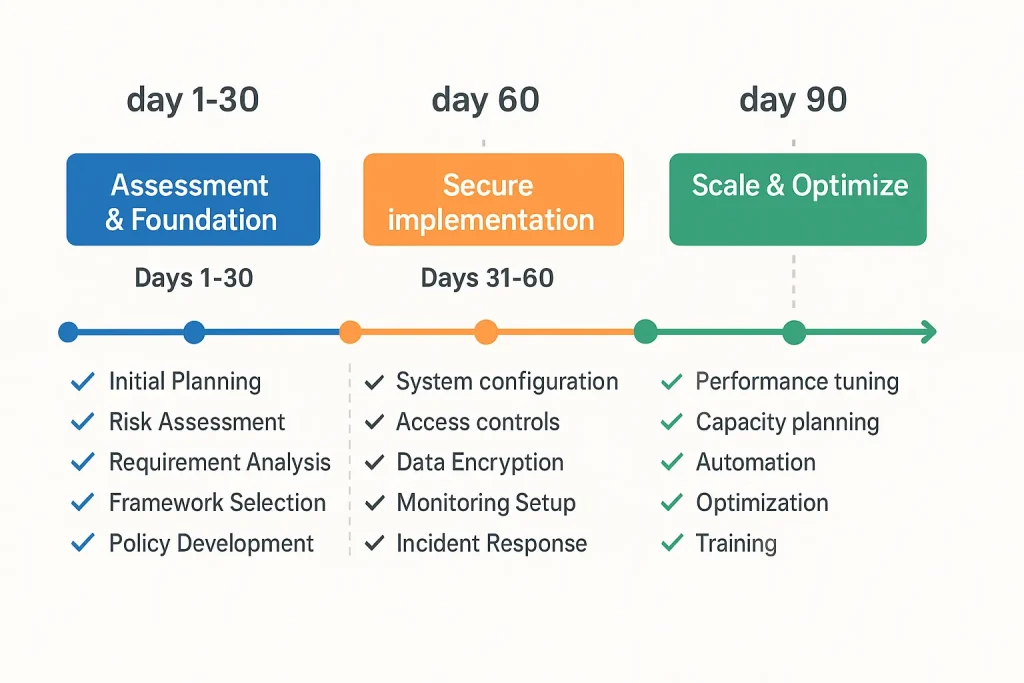
Phase 1: Assessment & Foundation (Days 1-30)
Step 1: Audit existing relationship intelligence across email, CRM, and meeting data
Step 2: Survey teams anonymously about current AI tool usage and security gaps
Step 3: Identify single points of institutional knowledge failure
Step 4: Benchmark current performance metrics (response rates, conversion rates, deal velocity)
Step 5: Select an enterprise-grade AI platform with organizational intelligence capabilities
Phase 2: Secure Implementation (Days 31-60)
Step 6: Deploy AI usage zones (Green, Yellow, Red security classifications)
Step 7: Implement knowledge preservation systems for critical expertise
Step 8: Connect the AI platform to marketing, sales, and customer success data sources
Step 9: Train teams on relationship intelligence identification and usage
Step 10: Establish automated research and proposal generation workflows
Phase 3: Scale & Optimize (Days 61-90)
Step 11: Measure performance improvements against baseline metrics
Step 12: Expand AI capabilities to partner relationship intelligence
Step 13: Implement predictive analytics for pipeline optimization
Step 14: Create automated upsell and cross-sell identification systems
Step 15: Develop AI-enhanced competitive intelligence gathering
Frequently Asked Questions About B2B AI Marketing Strategy
What percentage of B2B AI marketing implementations actually fail?
According to Gartner research, more than half of successful AI pilots never make deployment, resulting in unrealized value from AI investments. Only 1% of company executives describe their generative AI rollouts as “mature,” indicating widespread challenges in implementing this technology.
How long does effective B2B AI marketing strategy implementation take?
For organizational AI deployment, the timeline ranges from 15 minutes for basic browser-based tools to 2-4 weeks for comprehensive enterprise solutions. However, seeing measurable results typically requires 60-90 days of consistent usage and optimization.
What are the biggest security risks of using ChatGPT for B2B marketing?
The primary risks include intellectual property leakage, GDPR compliance violations (resulting in fines of up to 4% of annual revenue), exposure of competitive intelligence, and customer data breaches. As Tehranchi warns, financial information fed to open AI applications becomes part of training data accessible to anyone.
Which AI marketing tools should CROs prioritize first?
Focus on relationship intelligence systems, automated research briefings, and AI-assisted proposal generation. These three capabilities deliver 70% of the performance advantage over traditional approaches. Opt for organizational AI platforms over point solutions.
How do you measure ROI from B2B AI marketing strategy investments?
Start with baseline metrics (email response rates, proposal delivery time, and deal velocity), then track improvements every month. Companies typically see 15-30% improvement in response rates within 60 days and 25% faster deal closure within 90 days.
What’s the difference between AI marketing tools and organizational intelligence?
AI marketing tools solve individual problems (email writing, lead scoring), while organizational AI creates shared intelligence across marketing, sales, and customer success. The unified approach delivers 6x better results than fragmented point solutions.
How should startups approach B2B AI marketing strategy differently than enterprises?
Startups should leverage AI for faster iteration and testing rather than replacing large teams. They can deploy AI-assisted development, automated customer research, and relationship intelligence systems without the compliance overhead that slows enterprise adoption.
What compliance requirements are coming for AI-enabled B2B companies?
Expect SOC 2 Type II requirements for AI systems, data residency controls, AI explainability documentation, and decision audit trails. Large enterprises are already requiring these capabilities from vendors.
Social Proof & Results
Client Success Metrics (Confidential Case Studies):
- Series B SaaS Company: Response rates improved from 0.8% to 12.3% in 60 days using relationship intelligence
- Manufacturing Client: 300-person AI deployment delivered 67% increase in marketing qualified leads
- Fortune 500 Partner: Reduced proposal delivery from 3 days to 4 hours, leading to vendor preference
- Cleantech Startup: 4.2x more qualified leads with 76% less email volume through intelligent targeting
Over 5 years working with B2B tech companies from seed to Series C, these results represent consistent patterns across proper AI implementation.
About the Author
Vinay Koshy is the founder of Sproutworth, specializing in digital PR and strategic content marketing for B2B tech companies. With experience helping nonprofits, SaaS companies, and digital agencies implement AI-enhanced marketing strategies, Vinay has guided 40+ B2B tech startups through AI implementation challenges.
His expertise includes ghostwriting educational email courses for funded B2B tech startups and creating LinkedIn content strategies for C-suite executives. Through Sproutworth’s digital PR services, he has helped generate over $12 million in pipeline growth through strategic thought leadership content and high-authority link building.
Vinay’s insights on AI marketing strategy have been shaped by direct client work across cleantech, fintech, and enterprise software sectors, providing a real-world perspective on what works—and what doesn’t—in B2B AI implementation.
Related Resources
Continue Learning About B2B AI Marketing Strategy:
- How to Generate High-Quality B2B Sales Leads – Relationship-focused lead generation strategies
- LinkedIn Lead Generation with Neuroscience – Network intelligence for B2B growth
- Content Marketing Strategy for B2B Growth – Integrated marketing approaches
- ROI-Driven Content Marketing Optimization – Performance-focused content strategies
- Effective Communication Through Strategic Content – Clear messaging frameworks
Need help positioning your B2B company as an AI thought leader while these strategic shifts unfold? At Sproutworth, we specialize in digital PR strategies that establish market authority during technological transitions. Our approach combines strategic content placement with high-authority backlinks to ensure your insights reach the decision-makers driving industry change.
Ready to dominate AI marketing conversations in your sector? Let’s explore how strategic thought leadership content can enhance your market position while your competitors struggle with implementation.
Get Started Today: Contact us for a complimentary AI marketing strategy consultation and discover how our digital PR services can establish your company as the go-to authority in your industry. Our AI-driven email courses and LinkedIn content help executives communicate their expertise while building authority in their markets. Learn more about strategic content development.
Some areas we explore in this episode include:
Listen to the episode.
Connect with Mehdi Tehranchi
Subscribe to & Review the Predictable B2B Success Podcast
Thanks for tuning into this week’s Predictable B2B Podcast episode! If the information in our interviews has helped your business journey, please head over to Apple Podcasts, subscribe to the show, and leave us an honest review.
Your reviews and feedback will not only help me continue to deliver great, helpful content but also help me reach even more amazing founders and executives like you!

